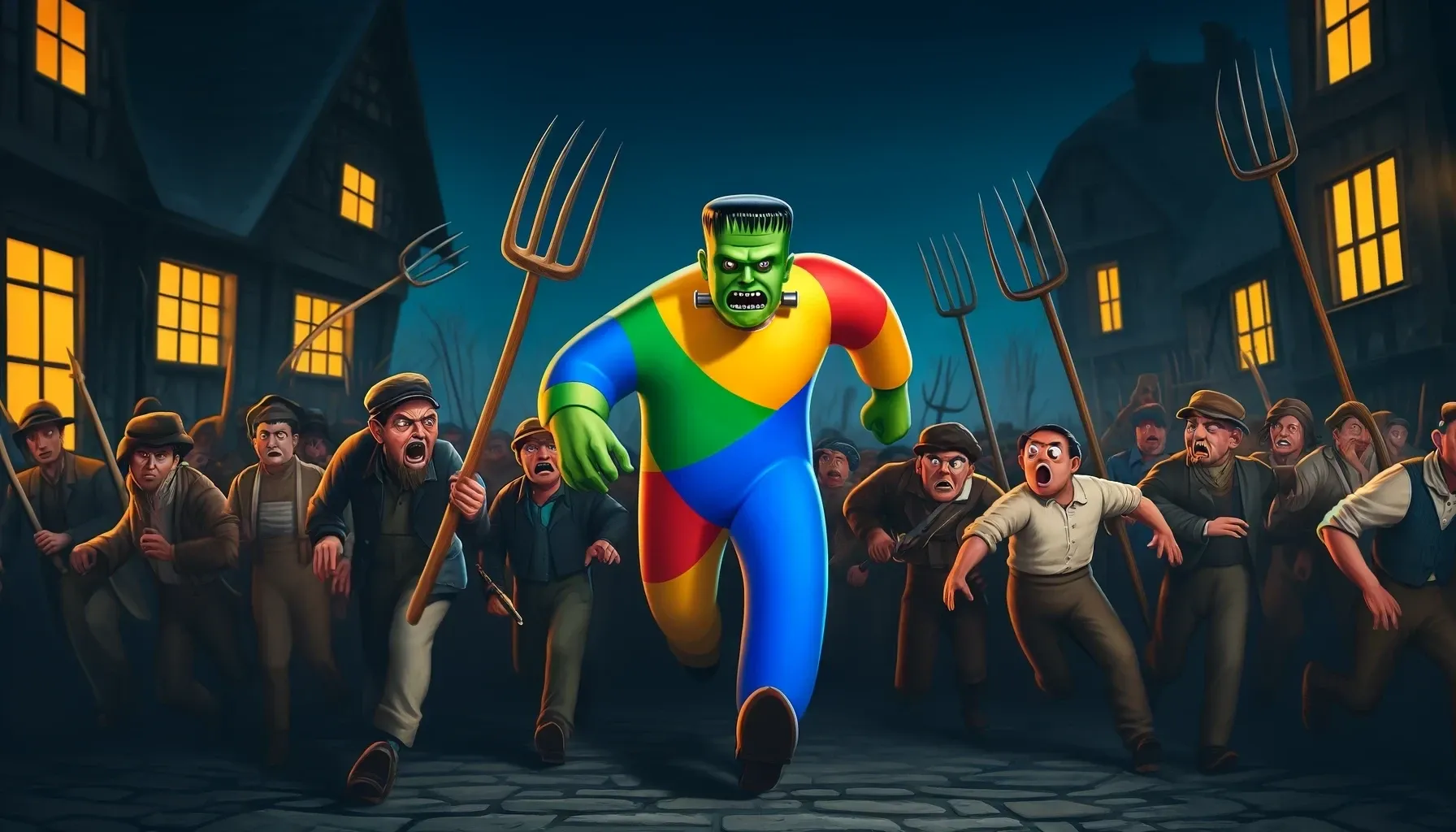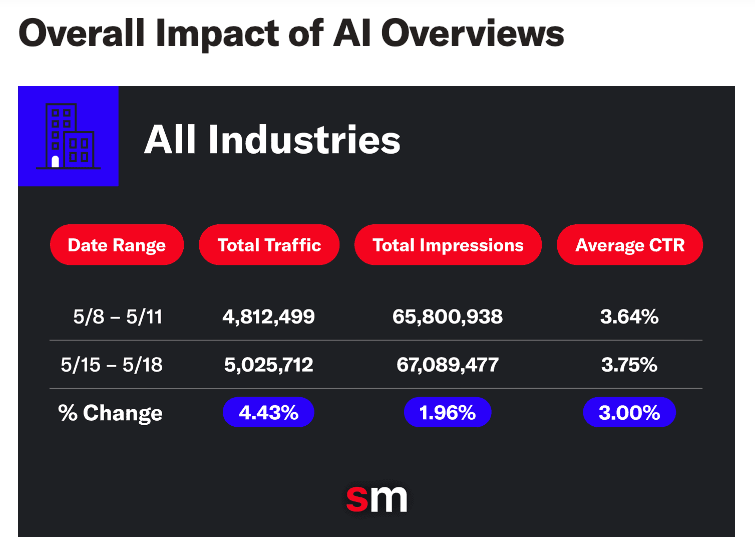SGE Drives Traffic, Gen-Local Search, Google CEO Evasions

AI Overviews = More Traffic?
Siege Media CEO Ross Hudgens initially predicted an "11% to 18% decrease in traffic from AI Overviews." That's much smaller than many had been forecasting. But a few days later he released a study (using data from 43 clients) that came to a different conclusion: AI could actually increase traffic and CTRs. This is what Google has been arguing to skeptical audiences. Across all clients in the study Hudgens found "an increase in impressions, average clickthrough rate (CTR), and total traffic since the overviews went live." The report is broken down into three client categories: SaaS, Fintech and B2C/E-commerce. AI Overviews showed up with different frequency in each of these. But on the whole there were more impressions, clicks and traffic after the introduction of AI Overviews. Hudgens attributes this to more engagement and query volume, which is what Google has been saying. While more data are needed to confirm Hudgens' findings, they're hopeful and suggest the sky isn't falling – at least in terms of AI Overviews.

Our take:
- This is tentatively good news for publishers and SEOs. As we've argued in the past, we need to see how people actually react IRL before judging.
- According to Semrush Sensor, AI Overviews appear pretty infrequently, though slightly more often in mobile results.
- A considerable number of people are still trying to turn off AI Overviews. Bing allows this but Google currently does not.
Google Wins with 'Gen-Local'
Local has always been the red-headed stepchild of search. But it emerges as a potential white knight and one of Google's key competitive advantages in this new AI-driven world. One of the things that struck us about the Google I/O keynote last week was the number of local examples the speakers brought up – again and again. Google never explicitly mentioned local but it was there in the background to subtly illustrate that Google has an unmatched local knowledge graph. Perplexity recently did a licensing deal with Yelp to beef up local results and Bing/Copilot of course has its own local graph. But nobody has more local data than Google. SOCi recently compared what we might call "gen-local" search results on multiple AI properties: Google SGE (AI Overviews), Gemini, Bing Copilot, Perplexity, Meta.ai and ChatGPT. The company ran six local queries and used several criteria to comparatively score the results. Interestingly, Gemini was the overall winner (beating SGE), with Bing and SGE tied for second. ChatGPT did the worst job with local queries, despite having access to Bing's local data.

Our take:
- While this was a fairly informal study it's interesting. I'm sure we'll see more such comparisons going forward and I'm sure ChatGPT will improve.
- Local intent search is a much bigger phenomenon than Google acknowledges. It touches most categories, especially services and product queries.
- Despite Bing's close second, it will be very hard to match Google's local depth, which the company will continue to emphasize as the competition intensifies.
Google CEO's Friendly Evasions
The Verge editor Nilay Patel gave Google CEO Sundar Pichai the toughest interview he's had in recent memory. Clearly uncomfortable with many of Patel's direct and even confrontational questions, Pichai is often evasive in his always friendly answers. Perhaps the best question is about how Sundar Pichai felt when he discovered that OpenAI had trained its AI video offering (Sora) on YouTube videos. The question seeks to put Pichai in the place of publishers and content creators on whose work Google has built its business. Pichai repeatedly likens the transition to AI-powered search to the shift from desktop to mobile. He adds that Google needs to support "the ecosystem," meaning content creators. "If there isn't a rich ecosystem making unique and useful content, what are you putting together and organizing, right?" Pichai again reports that AI Overviews are prompting more engagement but the reality is probably more qualified. "If you put content and links within AI Overviews, they get higher click-through rates than if you put it outside of AI Overviews," he argues. But he punts on a point-blank question about whether Google will break out AI traffic in Search Console. "It's a good question for the Search team; they think about this at a deeper level than I do," he defers.
Our take:
- Pichai repeatedly deflects and spins – all in a very well-intentioned-seeming way.
- He indirectly references DMA changes in Europe, when asked about Google not showing smaller sites: "Ironically, there are times when we have done changes to actually send more traffic to the smallest sites. Some of those sites which complain a lot are the aggregators in the middle. Should the traffic be going to the restaurant which has created a website with their menus and stuff, or are people writing about these restaurants?"
- Pichai comes across as sincere but also as a technocrat who doesn't fully accept responsibility for the real-world consequences of Google's decisions.
Recent Analysis
- Near Memo ep. 157: ChatGPT & Google I/O – how will users & SEOs adapt to the new Google AI features?
- Google I/O: Gemini Dominates Search, SGE Goes Live, by Greg Sterling.
Short Takes
- How to re-appeal a Google Business Profile suspension.
- Google AI support hallucinates customer service number.
- Uber brings "lists" (social content) to Eats food delivery.
- Google improves accessibility features in Maps.
- ChatGPT is bad at local search.
- OpenAI couldn't get Scar-Jo's voice so they deepfaked it.
- MSFT announces new AI PCs with "recall" feature.
- Tools to track AI Overviews; how AI Organized Pages may impact SEO.
- Everything Google announced at I/O, from new products to vaporware.
- Former head of Bing joins board of Perplexity.ai.
- Asking AI tools what does WTF mean?
- Apple News+ may be a lifeline for news pubs losing traffic.
- People prefer human-written content, AI disclaimers a turn off.
Listen to our latest podcast.

How can we make this better? Email us with suggestions and recommendations.

